- Home
- Jane Arbor
Queen's Nurse Page 6
Queen's Nurse Read online
Page 6
“Before you have to give him an answer? Has he asked you to marry him, Liane?”
Liane shook her head. “No. I meant before he does ask me in so many words, as I feel he means to. When I tried to tell him how grateful I was to him he retorted almost angrily that surely I knew why. And later he said that he was willing to wait, and I know what he wanted me to understand—that he hoped for the same as daddy did, but that he realized I hadn’t got over daddy’s death yet.”
“Your father would have been happy for you to marry Mr. Forester?”
“It was what he wanted most,” said Liane wistfully. “Muir had been almost a son to him, and his pet name for daddy was bwana—the native word for ‘master.’ And daddy told me he hoped Muir and I would marry, though I hadn’t begun to think of Muir in that way then.”
And now you have. And by one of the ironies of life you seek me out to help you to know that what you feel for him is love! So ran Jess’s thoughts, tumultuous and rebellious against a fate that had made her Liane’s confidante before she had learned to explain or to defy the strange challenge Muir Forester had made on her own heart. Did Liane love him? Did she love him herself? She did not want to face the answer to either question—yet.
From behind them Muir’s manservant had come through the French window to speak to Liane.
“Mr. Forester’s on the telephone, Miss Liane. He is calling from Boultings Farm. There’s been an accident, it seems.”
“Not to him?” The apprehension in Liane’s voice was matched by the swift stab of fear in Jess’s heart.
“No. One of the farm men has been caught in the thresher. The master would like to speak to you, and he asked particularly if Nurse Mawney was still here.”
“Come with me, Jess. It means he’ll want you, I dare say—” Liane sprang up and ran ahead of Jess to the telephone.
Jess stood by, listening to the one-sided exchange. “Yes, Muir. Yes, she’s still here. I think so—” Over her shoulder Liane asked, “You did come by car, didn’t you?” and handed the receiver over.
Muir’s voice came crisply. “I want you to come out here as soon as you can. You’ve got your car, haven’t you? Bring Liane with you—she knows the way. There’s a man badly lacerated all down one side—leg, arm and face. I’ve no transportation, as I rode out. You’ll start at once?”
“Of course.” Jess paused, then asked, “What have you done for the man who is hurt?”
“We’ve made him as comfortable as possible without moving him, as we can’t tell what other injuries he may have besides these frightful flesh wounds.”
“That’s wise. And you should wrap him warmly and give him some hot, sweet tea to counteract the shock—that is, if he is conscious.”
“I’ve seen to that, and I’ve applied some rough dressings.”
“Then I’ll start at once. How far is it?”
“Oh—two to three miles by the road, but Liane will direct you. You’ll find us in the threshing shed—the third farm building on the right when you reach the yard. Someone will be watching for you, but, nurse—don’t let Liane come in with you.”
“You mean—ask her to wait in the car?”
“Yes. She’s not too strong yet, and I don’t want her upset. If she makes difficulties on the plea that there might be something she could do to help, tell her it’s an order—from me.”
That, thought Jess as they went out to the car, was his love’s need to protect Liane. However tersely expressed, it was his care sheltering the girl, wrapping her about. For Jess a pulse that she did not want to know as one of envy throbbed momentarily, then quietened. Liane had come to her for help, wanted her for a friend. And in friendship there should be no room for envy.
When they reached Boultings Farm, Liane agreed to wait in the car, evidently being used to obeying Muir without question. Jess hurried across the yard to where, outside the big sliding doors of the threshing shed, Muir himself awaited her.
He looked at his watch, commenting, “You’ve made good time. Dr. Gilder can’t be here for half an hour yet, but you’ll do what you can, won’t you?”
Then he took Jess to her patient, explaining that though the farmhouse was at present without a tenant, one of the other men had produced hot tea from his own flask, and since then they had boiled water on a primus stove in the yard. There was a first-aid kit handy, of course, but probably Jess had all she wanted, hadn’t she?
From then on Jess took over. The injured man lay upon a bed of hay and was covered with the other men’s coats, including Muir’s. He was fully conscious and managed to summon a jaunty courage to the ordeal of having the cruel lacerations dressed and padded by Jess. She worked deftly and gently, and was watchful always that she was doing no more than he could bear.
Muir accepted without question the task of handing her what she wanted—water, bandages and scissors—and anticipated her needs more often than not. He rallied the man with jokes, and when Jess had finished he took the tattered clothing from her that she had had to cut away from the worst of the wounds.
“Good job this wasn’t your Sunday suit, Tim. Nice mess Nurse Mawney has made of it for you!”
“Ah, she has, so,” grinned Tim, who was Irish. “But isn’t it the insurance itself will be giving me another in its place? So for what would I be blaming nurse when she’s the instrument of getting me a fine new working suit for nothing? Could you find it in your heart to blame her yourself, Mr. Forester?”
“No, I couldn’t blame her,” said Muir evenly. He drew Jess aside. “What will Dr. Gilder do for him, do you suppose?” he asked.
“I expect he’ll have called the ambulance, but he’ll probably leave my dressings untouched until they get him to hospital. But I daresay he will give an ant tetanus injection and perhaps a little morphia.”
Muir looked at his watch again. “He can’t be long now. I’ll go and look out for him and have a word with Liane. You did bring her, didn’t you?”
“Yes. I might have missed the right road without her.”
“It is rather tricky, and the signposts seem designed to hinder rather than help. I suppose my summons cut across your tea party?” Muir paused, then added, “When we are clear of this, would you dine with us tonight instead?”
“Thank you. I’d like to, if there’s time for me to go and change after we’ve dispatched Tim to the hospital.”
“There will be, especially as tonight our time of dining will be more or less ordered by the time of the arrival of Lieutenant Seacombe, who will be staying with his mother while he is on leave. But I daresay Mrs. Seacombe told you.”
“Yes, she did.”
“Well, we shall expect you. Or rather I’ll get Liane to run the car down for you, as I don’t suppose you use your own except for official journeys.”
“No, I don’t. But please don’t let Liane bother. I can walk up to Quintains quite easily.”
The vestige of a frown creased Muir’s brow. “I’d like Liane to fetch you,” he said, making it sound like an order not to be questioned. “She is a very good driver and used to drive her father regularly out in Kenya. But lately she seems to have lost her nerve and is reluctant to use my car unless I insist. Which is absurd, when it’s among everything else that she must learn to regard as her own at Quintains.”
That meant everything with which his love longed to endow Liane, thought Jess, as he went out to meet Dr. Gilder. Everything material that he possessed. Everything—including himself.
An ambulance rolled in upon the tail of the doctor’s car, and when Dr. Gilder had briefly attended him, the man Tim was shipped into it and borne away to the Starmouth hospital. Dr. Gilder stayed to question Jess on her treatment of him and to hear from Muir the circumstances of the accident, and then drove away after offering Muir a lift, which was refused.
“Perhaps you’d let me drive you back?” queried Jess as he saw her across the yard to where Liane was still waiting.
“No, thanks. There’s no proper stabling her
e for my mare, so I’ll ride back as I planned. Liane—” he leaned inside Jess’s small car to address her “—Nurse Mawney is coming to dinner, and I want you to take the car down to fetch her when she’s ready. She’ll arrange times with you.”
“Oh—” Liane’s eyes widened. “All right, Muir. I’ll do that.”
“Good.” He nodded and strode away, and before she switched on the engine Jess laid a hand over Liane’s. “You don’t have to if you’d rather not,” she said. “Mr. Forester says you don’t care about driving his car, and I can easily walk up.”
“No. I must, or Muir would be angry. And he’s right, I know. It’s just my silliness. And you needn’t be afraid that I shall tip you in a ditch, because almost as soon as I get my hands on the steering wheel I realize I’m going to be all right and can’t remember why I refused. But each time I seem to need a fresh bit of courage to do it.”
“Doesn’t it get any better?”
“So far, no. But Muir wants me to keep on trying, so I don’t let him see that I mind too much. What time shall I come for you? It’s about a quarter to seven now.”
“Well, make it an hour from now, will you? I shall drop you at Quintains first, of course. What time is Lieutenant Seacombe expected?”
“Sometime this evening. He may have arrived. I wonder what he’ll be like? If he is as standoffish and correct as his mother, life from now on promises to be very, very difficult,” prophesied Liane gloomily.
It was an echo of Jess’ own fears, but it was surely a little unreasonable of them to criticize a young man whom neither had ever met? “You may not have to see much of him,” she consoled Liane, remembering Mrs. Seacombe’s reluctance to face the idea of her son’s sharing Liane’s company to the possible displeasure of Muir.
“I don’t know whether to hope that we shall or not,” Liane said. “If he is at all human, it might be quite fun—”
At her suggestion that it would be quicker, Jess drove up to Quintains by a back road through the gardens, where Liane could alight at the terrace where they had had tea.
“He has arrived. Look—” announced Liane as the car approached the house. Jess looked, too, and discerned a young man in uniform who sat smoking at the top of a flight of stone steps leading from the terrace to the lawns. He was fair, with a tanned skin and a thatch of sun-bleached hair, and as, at sight of the car, he stood up, she saw that he was very tall.
“Stay for a moment and help me out with him,” Liane urged Jess. But she ran up the steps, holding out her hand to Peter Seacombe with the eager friendliness that sprang from her natural good manners.
“You are Peter,” she said simply, as her hand rested in his.
“And you are Liane Hart—”
He released her hand, and they stood looking at each other with the curiosity of children and all young things the world over. Then Jess was introduced, and when she made ready to drive away Liane offered to show Peter the garden.
Before Jess moved off, Liane leaned into the car to whisper, “He seems quite human!”
Jess nodded and smiled and watched the girl rejoin Muir’s guest, her shadow, absurdly long and angular in the evening light, falling side by side with his across the grass.
CHAPTER FOUR
They dined by candlelight at a long refectory table with Muir at its head and Jess seated on his right; Peter Seacombe was beside her with Liane opposite to them, while Mrs. Seacombe, dining downstairs for the first time since her accident, faced Muir at the foot of the table.
Jess had changed into a black cocktail suit of finely corded silk. The skirt was slimly cut and she knew that the upstanding collar of the jacket framed her face becomingly. She regarded it as her standby for semiformal evening occasions, and she was glad of her choice when she saw that Liane was not in evening dress, either, but in a softly patterned surah of day length with a cunningly draped bodice and very full skirt.
On the short car journey back to Quintains after Jess had changed, Liane had not said much about Peter Seacombe except that he was “easy to talk to—easier than Muir.” But now her manner with him was reserved and quiet, and her attention all for Muir. A little, thought Jess, as if she were slightly ashamed of having found Peter good company when she was on the brink of being betrothed to Muir. Perhaps that was what she had meant by standards she found hard to live up to.
Naturally, the main topic was of Peter’s experiences abroad; his mother’s and Muir’s questions drew him out, and while he talked Jess decided that she liked him very much. His voice was light and abrupt with a hint of laughter in it—laughter that he frequently turned against himself, since he had little of the brash self-assurance of many young men of his age.
Mrs. Seacombe’s eyes and attention were all for him, and his manner with her was gentle and solicitous. With Muir he talked as a younger equal without embarrassing deference, which Jess and Liane had feared. But as he talked to Muir, Jess noticed that his eyes strayed often toward Liane as if he were slightly puzzled by her demure silence.
After dinner the three ladies adjourned to the lounge, leaving the men to follow. Mrs. Seacombe seated herself in a high-backed chair with her injured foot on a stool and took out a piece of petit-point embroidery. Jess sat down near her, admiring the work and offering to sort some skeins of wool that were tangled.
Liane was moving restlessly about the room and at last went to part the heavy curtains at one of the deep windows.
“It’s a lovely night,” she murmured.
“Lovely.” It was Peter who, entering alone, went to stand at her side and to look out with her at the sharply etched shadows of the moonlit garden.
Liane said, “Oh—it’s you—” and moved a step away from him.
Peter turned around to address his mother. “Do you know—it’s my first English night for nearly two years, and it might have been specially laid on for me! Would you or Mr. Forester think it rude of me if I wanted to step out into it—to feel it and to smell it, so that I can convince myself it’s really there?”
“Of course not,” Mrs. Seacombe assured him quickly. “I wish I could come with you.” She paused while her glance traveled from him to Liane and again from him to Jess. “Unless you want to go alone, perhaps Miss Mawney would go with you?” she suggested.
But Jess’s head was bent above her task and into the little silence Liane’s voice came upon a breathless note, “I’ll come if you like—”
“Would you really?” He sounded surprised and grateful. “You ought to have a wrap though.”
“I’ll fetch one.” Liane’s skirts swirled with a rustle of silk as she ran lightly from the room, and until she returned there was no other sound but the occasional tap of Mrs. Seacombe’s needle against her thimble as she worked.
Jess glanced at her, hoping that she exaggerated the meaning of the disapproving set of the older woman’s lips but realizing, in the light of the afternoon’s conversation, that probably she did not. Mrs. Seacombe had reasons, which seemed good to her, for not wanting to encourage a friendship between her son and Liane. But what, Jess wondered, could she be afraid of, when Liane’s quiet dignity at dinner had shown that her real loyalties lay with Muir?
Muir came in, addressing Jess before he noticed that the other two were not there. “I’ve phoned the hospital to ask about Tim,” he said. “He is very comfortable, and the sister I spoke to had a word of praise for the first aid he had received—” Muir broke off and looked about him. “Where is Liane?” he asked Mrs. Seacombe.
Mrs. Seacombe pursed her lips. “It’s the boy’s first night in England and he did say he hoped you wouldn’t think it rude of him to go out, but I shouldn’t like you to think he wanted to overstep his privileges as your guest. And he didn’t ask Miss Hart, you understand. She suggested she should go with him.”
Jess had the feeling that Mrs. Seacombe’s explanation was for her own satisfaction as much as for Muir’s. Perhaps he perceived it, too, for he ignored it. He went to lean an elbow on the ma
ntelshelf near Jess and, looking down at her, inquired, “You didn’t find the moonlight sufficiently alluring, Miss Mawney?”
She smiled. “I was busy,” she said simply, indicating the knot of wools in her lap.
“Making pleasure wait upon duty? How admirable of you!” There was a disturbing hint of mockery behind the words, and Jess felt the ready color rising in her cheeks. But when she glanced up at him he had turned again to Mrs. Seacombe.
“I wanted to speak to you when Liane wasn’t there,” he was saying. “You know she will be twenty-one next month—on the fifteenth? You will be getting about fairly normally by then, I expect, and I should like to make it an occasion for her—dinner and a small dance so that she can have the opportunity to meet some of the people I’d like her to know around here.”
His own friends, to whom Liane, as his wife, will eventually act as hostess. The thought, sharp and unbidden, thrust into Jess’s mind. She heard Mrs. Seacombe saying deferentially, “Well, I had wondered about it, Mr. Forester, but of course I didn’t know what you would feel about entertaining for Miss Hart just now. I mean—” Clearly she found the suggestion slightly shocking.
“Why not?” Muir’s question stabbed straight at her implied doubt of its propriety. “Why not, when her best chance of forgetting the tragedy behind her is to be drawn as early as possible into our circle here, one that is ready and waiting to welcome her? I can’t think,” he added almost to himself, “that her father would have grudged her that.”
Mrs. Seacombe flushed. “I wasn’t presuming to criticize, Mr. Forester—”
“I realize that. Think nothing of it. I wanted to find out if you felt equal to it before I spoke to Liane. If you hadn’t Jane Bretton would have acted as hostess for me, I daresay. I’ll give you a list of the guests I want invited later. Meanwhile, we’ve already got a small nucleus—Miss Mawney, I hope you’ll forego a formal invitation by accepting one from me now?”

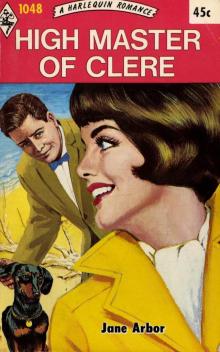 High Master of Clere
High Master of Clere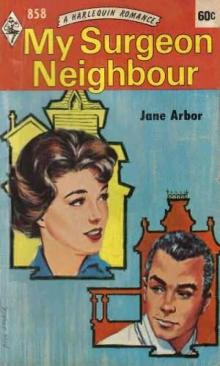 My Surgeon Neighbour
My Surgeon Neighbour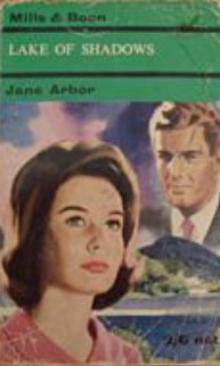 Lake of Shadows
Lake of Shadows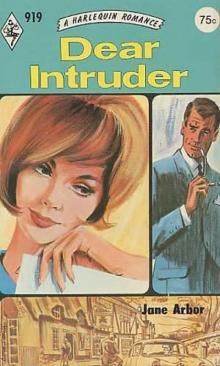 Dear Intruder
Dear Intruder Flash of Emerald
Flash of Emerald Return to Silbersee
Return to Silbersee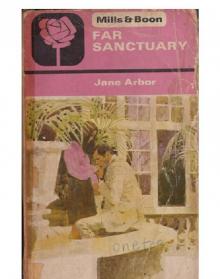 Far Sanctuary
Far Sanctuary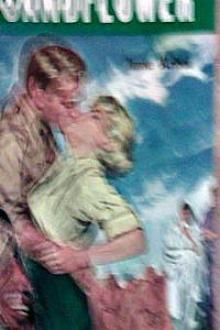 Sandflower
Sandflower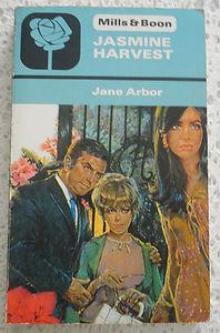 Jasmine Harvest
Jasmine Harvest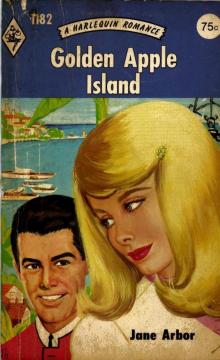 Golden Apple Island
Golden Apple Island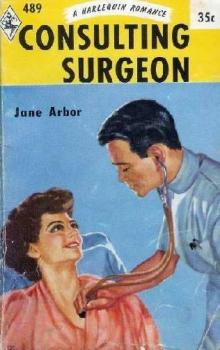 Consulting Surgeon
Consulting Surgeon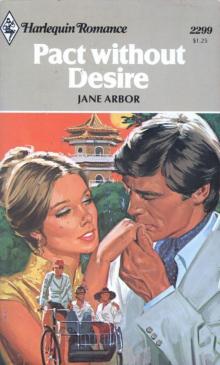 Pact without desire
Pact without desire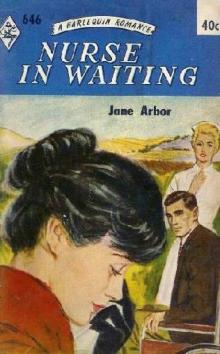 Nurse in Waiting
Nurse in Waiting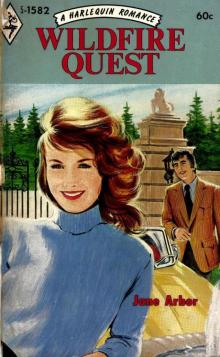 Wildfire Quest
Wildfire Quest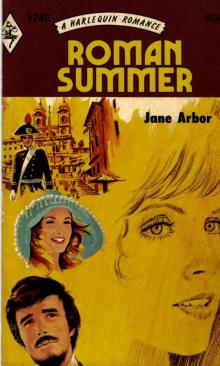 Roman Summer
Roman Summer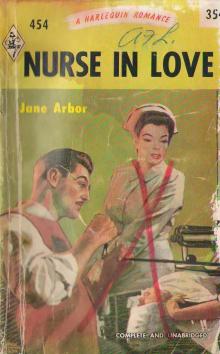 Nurse in Love
Nurse in Love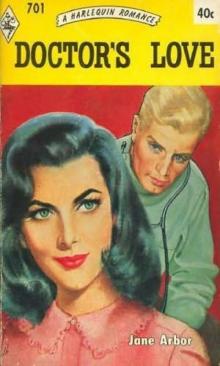 Doctor's Love
Doctor's Love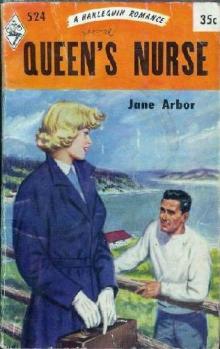 Queen's Nurse
Queen's Nurse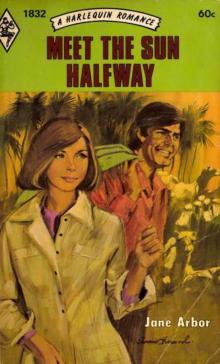 Meet the Sun Halfway
Meet the Sun Halfway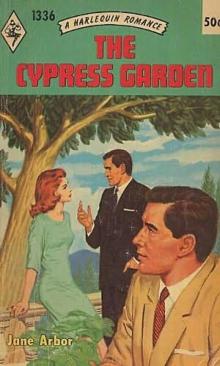 The Cypress Garden
The Cypress Garden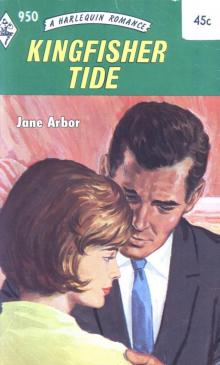 Kingfisher Tide
Kingfisher Tide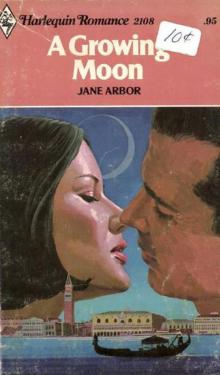 A Growing Moon
A Growing Moon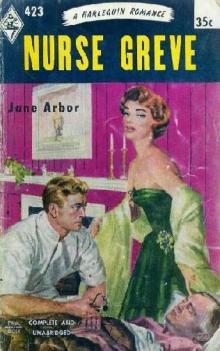 Nurse Greve
Nurse Greve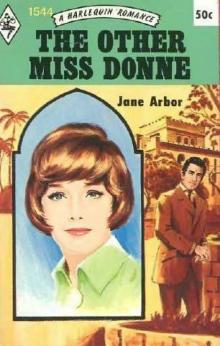 The Other Miss Donne
The Other Miss Donne